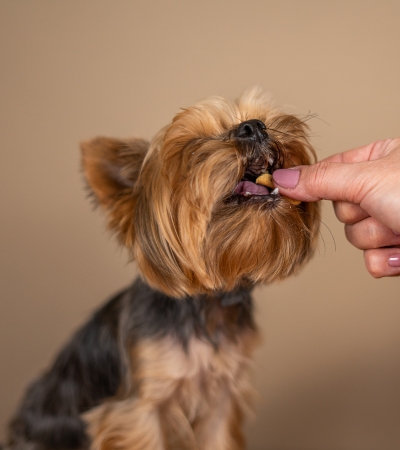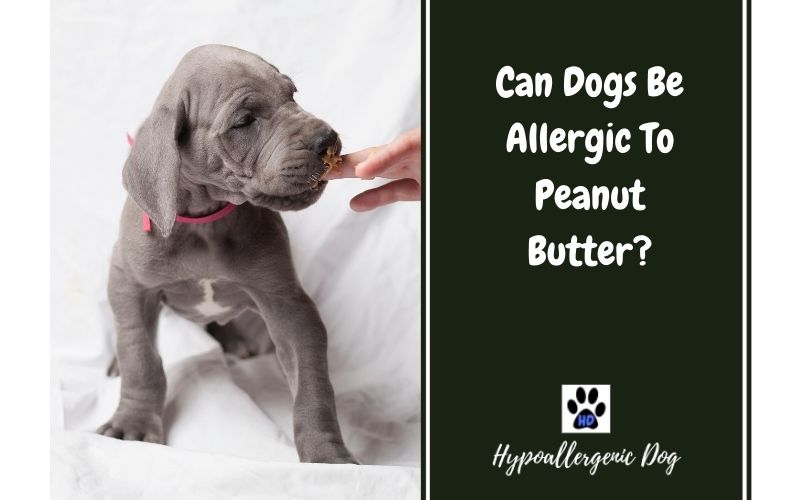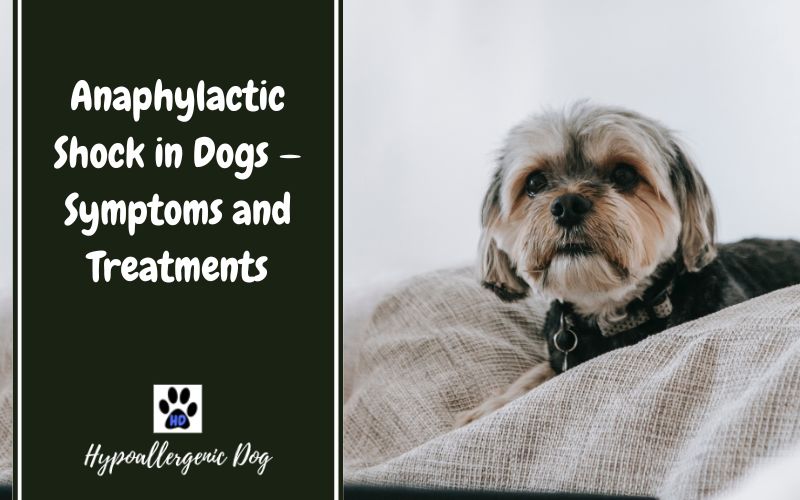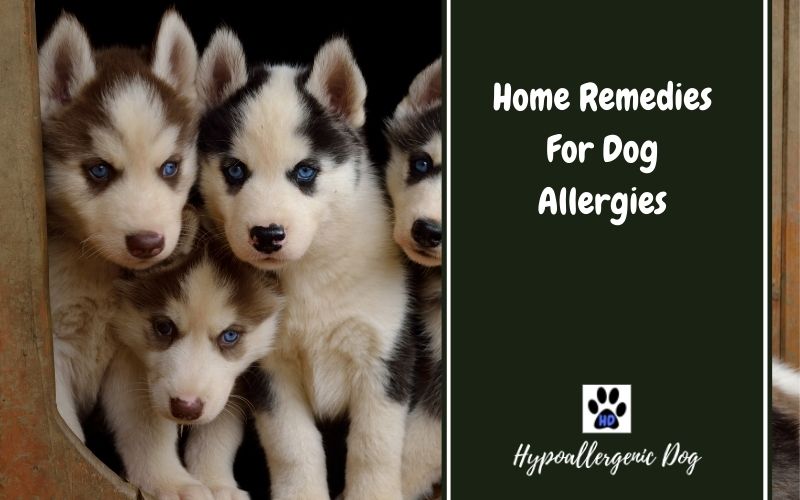Can Dogs Be Allergic To Peanut Butter? Contents
Can Dogs Be Allergic To Peanut Butter?
Peanuts are high on the allergen list for humans, but what about pets? Can a dog be allergic to peanut butter?
You can use this tasty treat as a creative way to encourage your pooch to take their meds or to keep them occupied during situations they aren’t comfortable with. Yet, while we all love to spoil our furry friends, could your pup’s favorite snack be causing more harm than good?
Hence, to answer this question and more. I’ve put together a list of all the symptoms of pet allergies in dogs you should be aware of, what else to avoid and what you can do to help your furry friend.

Peanut butter can be a great source of protein, especially if your dog is a little finicky with their food. However, if the peanut butter spoon makes an appearance often, your pooch could build an intolerance to the very food they can’t get enough of.
If you think your dog is allergic to peanuts, here are some of the signs and symptoms that might confirm your suspicions.
Hay Fever-Like Symptoms
If your pup has red, itchy eyes and is constanlty sneezing, you might initially think it’s hayfever. They may have a runny nose, which is another sign of seasonal allergies, but this can also indicate that your dog is allergic to peanut butter.
Excessive Itching and Licking
If Fido has a dog allergy to peanut butter, you may notice them scratching or licking themselves a lot more than usual. These immoderate actions can lead to fur loss and inflammation, as well as causing sore spots on their body.
The scratching may be confined to certain areas, or they may pay particular attention to one place, such as the rear end, the feet, and the ears.
Digestive Problems
Allergies can trigger all sorts of digestive issues and upsets. Hence, if your pet is suffering from a dog peanut allergy, this may be one of the most obvious symptoms.
Your furry friend could appear bloated, or keeping food down could be a struggle for them — due to vomiting or diarrhea.
If this is the case, you should immediately seek advice from your veterinarian to ensure that your pup is still getting all the nutrients they need.
Skin Rash or Hives
Dogs allergic to peanut butter may suffer from skin rashes, hives, or breakouts. Your pup may have sores that are taking a while to heal or some new patches of rashes or inflammation linked to their allergy. If you notice this, get it checked out right away.
Anaphylactic Shock
This is a clear and serious sign of an extreme allergic reaction from your dog. If after consuming peanut butter — or something that potentially contains traces of peanuts — your pet starts displaying symptoms, such as:
- Drooling.
- Vomiting.
- Diarrhea.
- Seizures.
You must seek professional help immediately — if anaphylaxis is left untreated, it will most likely lead to the end of your pet’s life.

If you believe a peanut butter allergy is responsible for your dog’s discomfort, get in touch with your veterinarian. They will help you establish a diagnosis.
Your vet may wish to conduct blood tests and take urine samples to confirm whether or not something else is to blame. However, your pup will likely be put onto an elimination diet to figure out whether peanuts are the culprit. This food regime will involve cutting out any foods containing peanuts from your dog’s diet for a set timeframe.
The condition will be monitored, and once your dog has been symptom-free for a while, peanut products will be slowly reintroduced. If your dog has a reaction, you will know they’re allergic!
Once an allergy has been confirmed, the only surefire treatment is the total exclusion of peanuts and any foods that contain traces of them. Antihistamines may also be prescribed.
Peanuts and Peanut Butter — What Else to Watch For?
While some foods are toxic to dogs, peanuts aren’t one of them. However, you do need to take note of the other ingredients before dropping them into your cart. Some brands of peanuts and peanut butter contain ingredients that aren’t safe for your dog and in fact, can even poison them.
Xylitol
A substitute for sugar and is used in some peanut butter. Xylitol is becoming increasingly popular, and while it’s perfectly OK for humans, it’s extremely harmful to dogs.
Why Is Xylitol Dangerous for Dogs?
For comparison, xylitol is even more toxic to dogs than chocolate, and a single gram of it in a dogs system can have devastating effects such as:
- Staggering.
- Disorientation.
- Collapse.
- Seizures.
- Lethargy.
The tiniest amount of xylitol can be dangerous to your dog. Consuming just 0.1 grams per kilo of body weight can cause your dog to experience symptoms such as low blood sugar levels. And, at 0.5 grams per kilo of body weight, it can potentially lead to liver failure.
For more information, check out this short video.
Salt
Too much sodium in their diet isn’t good for your dog either. Excessive salt intake can cause:
- Increase thirst and urination.
- Diarrhea.
- Vomiting.
Hence, if you’re dishing out peanuts, ensure they’re unsalted and unflavored. Think raw or roasted, and don’t go overboard with the portion size.
How to Avoid Developing an Allergy
Ensuring that your pet eats a varied and balanced diet is the best way to avoid allergies and intolerances. Protein is a canine-crucial staple, yet it’s also a prime food group for allergens, so it’s a good place to start.
Protein Alternatives
As we’ve discussed, varying your pup’s diet is crucial. This helps to keep them healthy and happy — and avoids any problems that can occur from eating the same food too frequently. If you’re stuck for inspiration, here’s a shopping list of ideas:
- Beef.
- Pork.
- Goose.
- Eggs.
- Broccoli.
- Lentils.
- Chicken.
- Duck.
- Quinoa.
- Spinach.
- Venison.
- Eggs.
- Fish.
- Lamb.
- Rabbit.
- Soy.
Protein Snack Alternatives
Admittedly, peanut butter isn’t going to make up a large portion of your dog’s protein intake, but it’s often used as a treat for dogs. This can be a pain if your dog is showing any signs of an allergy to it. So, I’ve put together some nutty alternatives:
- Almond Butter.
- Cashew Butter.
- Sunflower Butter
- Pumpkin Seed Butter.
You should note — your dog may be allergic to any of these substitutes, so you would need to closely monitor them for any signs or symptoms.
Raw Diet
Raw food diets are becoming increasingly popular, and they’re ideal if your pup is prone to allergies. This type of diet typically consists of organ meat, such as liver and kidneys, raw mince or meat on the bone, ground or whole bones, eggs, and yogurt.
Advocates of the raw food diet note that their pets have healthier coats, skin, and teeth. Higher energy levels and smaller stools have also been reported.
However, not everyone backs this food regime. For one, it’s not a good idea for puppies, and dogs with ailments — due to their low immunity levels. If you think this diet may benefit your pooch, speak to your vet for advice.

Conclusion
It’s crucial that your pup enjoys a balanced and varied diet to avoid allergies or intolerances materializing.
Your vet will be able to diagnose the issue and offer you some suggestions for peanut-free diets and foods. And, remember, if you suspect a serious reaction, like an anaphylactic shock — seek immediate medical help.
To sum it up — can dogs be allergic to peanut butter? Yes, they can. However, now you know the symptoms, you can be on the lookout and take action. The most important thing is that your pup is happy and healthy.
Dog Peanut Allergies FAQs
“What Is the Most Common Dog Allergy?”
Just like people, dogs can develop allergies. Food allergies are one of the most common. Peanuts, chicken, even wheat, or gluten can cause a reaction in dogs.
If you suspect that your pooch has an allergy, seek medical attention. Your vet can help you diagnose and treat the condition.
“What Kind of Peanut Butter Is Safe for Dogs?”
Peanut butter is a firm favorite among dog owners and is a great source of protein for your furry friend. However, more and more brands are choosing to use xylitol, which isn’t safe for dogs!
This sugar-replacement sweetener is ideal for dieting humans but extremely poisonous to canine companions. So, if you’re looking for pup-friendly peanut butter, check the ingredients and dodge any that include xylitol.
“Can a Dog Suddenly Become Allergic to His Food?”
Yes. Even if your dog has eaten something for their whole life, they can become allergic to an ingredient at any point.
“How Can I Ease My Dog’s Allergic Reactions?”
If you suspect your dog might be allergic to something in their food — avoiding the offending food is the only effective solution. An elimination diet is employed to find the culprit.
For non-food-related issues your veterinarian will work with you to find the source of the allergy — they may prescribe antihistamines or steroids to help.
“Is Coconut Oil Good for Dog Allergies?”
Coconut oil is a rich source of healthy fats and fuel and is said to be anti-inflammatory and anti-fungal. While it may improve skin conditions and even allergies, official research is lacking.
“Can Dogs Have a Reaction to Peanut Butter?”
Yes. Check out my dog allergic to peanut butter symptoms section above to find out the full details.




